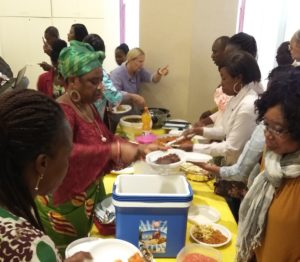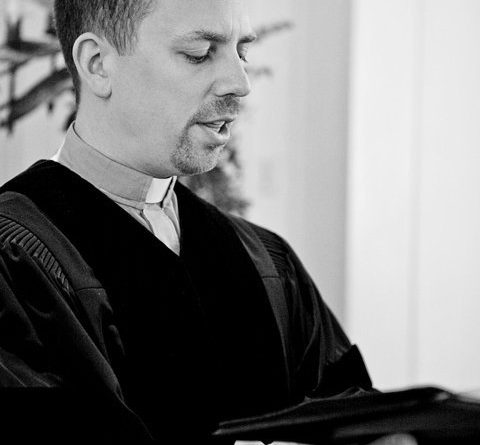Mission Stories: Being Church Together by Tim TenClay
Twenty years ago, as an eager, optimistic college student, I spent the summer teaching English in Hong Kong for the Reformed Church in America through a project called SWAP (Summer With a Purpose). Upon returning home, I remember thinking: Overseas missions may be in my future.
Never, as that experience fell further and further into the past, did I expect that ministry might take me and our family to Sicily (Italy). Yet, we are now beginning our fourth year in Southern Italy partnering with the Waldensian church in ministry to and with migrants from Africa and the Middle East.
Almost all of my work is based on a concept called Essere Chiesa Insieme (Being Church Together). Essere Chiesa Insieme is a philosophy (adopted in 2013) of the Waldensian church to seek to “be church together” despite racial, ethnic, cultural, and often linguistic differences. In practice, this means that they have committed to not plant ethnic congregations, but rather to commit to the (often difficult) work of “being church together.” Thus, two of the three congregations I serve here in Italy are bilingual and majority African.
It has been an eye-opening experience dealing with privilege, numeric majority versus power majority, biblical interpretation, cultural definitions of family, differing concepts of piety and worship, and above all what it means to “be together.”
“Being together” is only easy when the people seeking to be together think, look, act, speak, smell, and interpret the bible in the same way. When divergence enters into the equation on any of those levels, it becomes much more difficult.
As an American, I’m well aware of our long history of schism, and the more I’ve thought about that over the past years, the more it has become clear to me that schism becomes more likely and acceptable when we are in positions of power and majority. Here in Italy, Protestants make up approximately .8% of the population – .8% of roughly 60 million people. Protestants have to cooperate. Indeed, for 40 years, the Waldensian and Methodist churches have been working under a covenant of integration (i.e. they function under a single umbrella denomination). This, because of their minority status, is both possible and essential to their survival. Not living in communion is not an option.
I couldn’t agree more. Obviously, this does not diminish cultural, doctrinal, and hermeneutic differences. Sometimes those differences are colossal and significant. It does, however, require that we never forget or sacrifice the unity we have with one another in Christ (as a result of our unity with Christ). Being Christian requires being Christians together.
My favorite theologian put it this way:
The spirit of sect [division], wherever it may prevail, involves necessarily a false view of the person of Christ, and is utterly incompatible thus with sound Christian orthodoxy. As a spirit at once of heresy and schism, in this way, we pronounce it to be emphatically the Antichrist of the Church in our own time. So far as its power goes, it is at war with the whole fact of the incarnation.[i]
I find myself consistently asking (both personally, and on behalf of the denomination in which I am ordained): Does God want division in the Church?
The answer to that single question tells us everything we need to know. If it is something God wants. We can (and should) feel comfortable dividing ourselves along racial, cultural, linguistic, doctrinal, hermeneutic and preference lines.
If we answer that single question with the word “no”, we must learn how to “be together”, even when it is difficult.
Admittedly, this is much easier said than done.
Every week I climb into the pulpit in an attempt to proclaim God’s word to congregations who have little more than Jesus in common, and every week I am reminded that “having Jesus in common” is enough.
Don’t misunderstand me! We sometimes offend each other. We sometimes hurt each other. We often “speak past” one another. We have differing assumptions (even on things as simple as what it means to “be a Christian”). Nonetheless, each of those (very real and sometimes very profound) difficulties lose their power to divide us if we truly believe that every human being is created in the image of God and that “we were all baptized into one body—Jews or Greeks, slaves or free—and we were all made to drink of one Spirit.”[ii]
 How do we do it? We begin with that one question: Does God want division in the church?
How do we do it? We begin with that one question: Does God want division in the church?
If the answer is yes: we have permission and reason to divide.
If the answer is no: we must learn how to live together.
In my mind, the question is simple. It is living out our answer to the question that is so difficult. Indeed, humanly-speaking, I would argue: it is impossible.
It is impossible to “be church together” unless we trust entirely in God (through the Holy Spirit) to make our ontological unity in (and with) Christ a lived (and livable) reality.
I often ask myself: is it worth it?
Is it worth the pain and frustration of never-ending cultural and theological mediation? Is it worth the sacrifice of family and self to live in a community that is so (so very) different from what my personal preferences and history lean towards? Is it worth the time and energy of preparing bilingual and intercultural liturgies and sermons?
And the answer is: it doesn’t matter. Whether I think it’s worth it or not, is irrelevant.
The question is: Does God want division in the church?
 There are those who might think the question is naïve. Indeed, if I had asked the question 10 years ago it probably would have been. Today, however, I know the pain and difficulty that a negative answer to that question brings. Today, I know the tensions and the frustrations. Today, I have profoundly lived into (at least begun to live into) the struggle – but also the joy – that my answer to that question causes.
There are those who might think the question is naïve. Indeed, if I had asked the question 10 years ago it probably would have been. Today, however, I know the pain and difficulty that a negative answer to that question brings. Today, I know the tensions and the frustrations. Today, I have profoundly lived into (at least begun to live into) the struggle – but also the joy – that my answer to that question causes.
That same theologian once put it this way:
Christianity is the universal solvent, in which all opposites are required to give up their previous affinities, no matter how old and stubborn, and flow together in a new combination, pervaded with harmony only and light at every point.[iii]
My response is simple: Amen!
[i] 37, https://wipfandstock.com/the-anxious-bench-antichrist-and-the-sermon-catholic-unity.html
[ii] 1 Corinthians 12:13
[iii] 1, Ibid.
Tim TenClay is an ordained minister of Word and sacrament in the Reformed Church in America. He grew up in Iowa and has graduated from Central College (Music and Religion), Western Seminary (M.Div.), and Northern Theological Seminary (D.Min.). He has served churches in Michigan, New York, Naples (Italy), and is currently pastoring congregations in Palermo, Marsala, and Trapani on the island of Sicily (Italy). He is a husband, father, knitter, baker, and slow (but steady) bicycle-rider.

